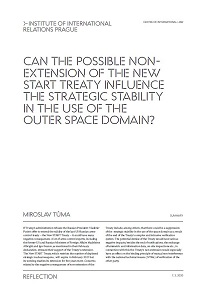Can the Possible Non-extension of the New START Treaty Influence the Strategic Stability in the Use of the Outer Space Domain?
Can the Possible Non-extension of the New START Treaty Influence the Strategic Stability in the Use of the Outer Space Domain?
Author(s): Miroslav Tůma
Subject(s): Government/Political systems, International relations/trade, Security and defense, Political behavior
Published by: Ústav mezinárodních vztahů
Keywords: New START Treaty; The Outer Space Treaty; security situation; US-Russia security relations;
Summary/Abstract: If Trump’s administration refuses the Russian President Vladimir Putin’s offer to extend the validity of the last US-Russian arms-control treaty – the New START Treaty – it could have many negative consequences. A lot of arms-control experts, including the former US and Russian Ministers of Foreign Affairs Madeleine Albright and Igor Ivanov, as mentioned in their February declaration, stressed their support of the Treaty’s extension. The New START Treaty, which restricts the number of deployed strategic nuclear weapons, will expire in February 2021 but its wording enables its extension for five years more. Concerns related to the negative consequences of non-extension of the Treaty include, among others, that there could be a suppression of the strategic stability in the use of the space domain as a result of the end of the Treaty’s complex and intrusive verification system. The potential demise of the Treaty would have various negative impacts; besides the end of notifications, the exchange of telemetric and information data, on-site inspections etc., in connection with this the Treaty’s non-extension would especially have an effect on the binding principle of mutual non-interference with the national technical means (NTMs) of verification of the other party.
Series: IIR - INTERNATIONAL LAW REFLECTIONS
- Page Count: 4
- Publication Year: 2020
- Language: English
- Content File-PDF

